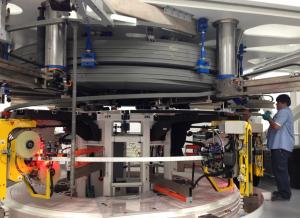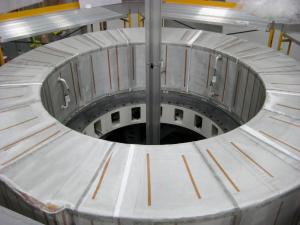Approximately 116 km of Kapton and fiberglass tape were used to wrap the 224 coil turns at the perimeter of the qualification coil with six successive layers. For a true production module, which is made up of 560 turns, more than double that amount—or 300 km—will be needed.
"From here, the qualification coil will be vacuum-pressure impregnated with 2,000 litres of resin, permeating the glass cloth and further insulating the coil," said John Smith, ITER program manager for General Atomics.
The epoxy resin impregnation is scheduled to be completed by late December 2016. At that stage, the demonstration coil will be nearly 80 percent through its two-year fabrication process.
"The scale of this central solenoid project is remarkable, as is the amount of engineering and fabrication work that brought us to this milestone. Watching this project continue to progress has been immensely gratifying," added Smith.



